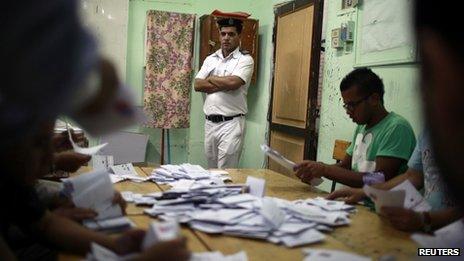Egypt election: Rivals claim run-off places
- Published

The Muslim Brotherhood's candidate for Egyptian president, Mohammed Mursi, is likely to face former Prime Minister Ahmed Shafiq in a run-off vote, according to partial election results.
More than 11,000 out of 13,000 polling stations have declared results, in the first election since strongman Hosni Mubarak was overthrown last year.
Early counts put Mr Mursi on about 26% and Mr Shafiq at roughly 24%.
Partial results are subject to recounts and final results are due on 29 May.
The nationalist Hamdin Sabbahi, a fiery opponent of the Mubarak regime who became the choice of many of those supporting the revolution, appears to be in third place.
He has taken a big lead in Alexandria, Egypt's second city, the city's electoral authorities have announced.
Campaigners for Islamist candidate Mr Mursi, standing for the Brotherhood's Freedom and Justice Party, told reporters they were confident that he had won the most votes.
"I think we are on the verge of a new era. We trusted God, we trusted in the people, we trusted in our party," prominent Brotherhood figure Essam el-Erian told a news conference late on Thursday.
Mr Mursi represents a popular strand of political Islam that was excluded from the political process for many years under Mr Mubarak.
Partial counts suggested Mr Shafiq would be Mr Mursi's rival in a run-off.
The two candidates are seen as representing very different strands of Egyptian society.
Mr Shafiq, who served briefly as Mr Mubarak's prime minister, is regarded by many as a creature of the old secular regime.
Analysts say he drew his support from people fearful of an Islamist takeover, and those exhausted by the upheavals of the past 16 months.
The BBC's Jon Leyne in Cairo says the two old power centres in Egyptian politics - the army and the Brotherhood - will go head to head in what could be a very polarised battle.
For many Egyptians it is not an ideal choice, but it seems the two candidates closest to the revolutionaries of Tahrir Square - Mr Sabbahi and former Arab League chief Amr Moussa - split that vote, our correspondent adds.
Mr Moussa appears to have come fifth - behind independent Islamist Abdul Moneim Aboul Fotouh, who is in fourth place according to most counts.
Historic
No candidate appeared close to reaching the 50% threshold necessary for an outright victory.
About 50 million people were eligible to vote in the polls, in which 13 candidates are vying for the presidency.
It was the country's first freely contested presidential election in its history, and observers said it had been conducted peacefully.
US Secretary of State Hillary Clinton congratulated Egypt on its "historic" election and said Washington looked "forward to working with Egypt's democratically elected government," according to a statement released by her spokeswoman.
Turnout appeared to vary across the country on Thursday, the second day of voting.
In Cairo, there were long queues at some polling stations but elsewhere, such as Alexandria and Suez, there were reports of slow voting.
Egypt's election commission estimated that about 50% of eligible voters had participated, reported official news agency Mena.
The military body that assumed presidential power in February 2011 - the Supreme Council of the Armed Forces (Scaf) - has promised a fair vote and civilian rule.
Until a new constitution is approved it is unclear what powers the president will have, prompting fears of friction with a military which seems determined to retain its powerful position.